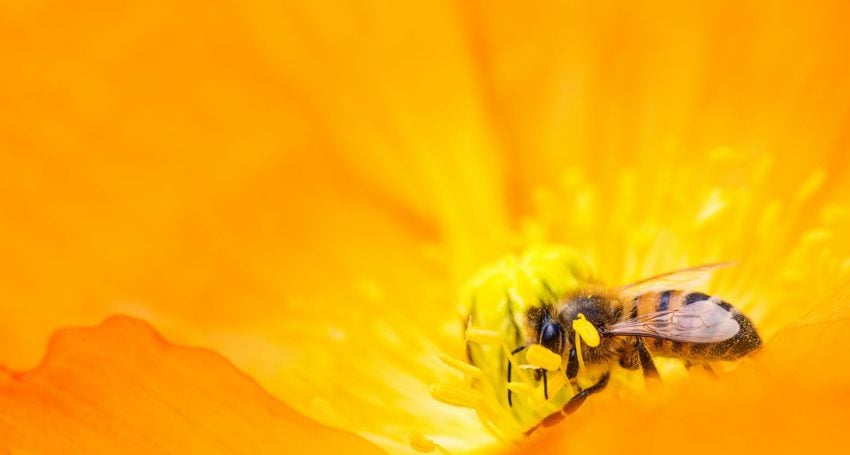Playing Jenga with the planet
Justice & Advocacy
“I became a Christian long before I became a biologist. As I contemplate care for the planet, I see my understandings of the Bible and biology intertwining like the strands of the DNA molecule that has been my preoccupation for my 45 years in research,” says Professor Philip Batterham

The game of Jenga starts with a tall tower being built with wooden blocks. Players take turns to remove blocks, one at a time. The player who removes a block causing the tower to fall loses the game. If I wanted to end a game of Jenga quickly, I would clumsily pull out a block from the bottom of the tower, causing it to topple.
That is what we are currently doing to life on this planet.
I became a Christian long before I became a biologist. As I contemplate care for the planet, I see my understandings of the Bible and biology intertwining like the strands of the DNA molecule that has been my preoccupation for my 45 years in research.
Our planet has a rare capacity to sustain life that comes from the composition of soil, an abundance of water, and an ideal combination of gases in our atmosphere. There are critical cycles that are elegant and so finely balanced. Plants take carbon dioxide from the air and convert it into sugars that provide energy for plants and the creatures that feed on them. Plants and animals respire replacing the carbon dioxide withdrawn from the atmosphere. Water is cycled through precipitation and evaporation. These are the foundations upon which the pyramid of life is built.
Just as all life on this planet is dependent on these chemical and physical elements, all life forms are interdependent as they live together in ecosystems. In nutrition, for example, plants are a resource for many insects and other herbivorous animals. Insects can be a substantial food resource for many small animals and birds which in turn are consumed by carnivores. At the base of this pyramid there are plants and insects. At the highest levels we have mammals, including us.
Advertisement
It stands to reason that if we erode the base of the pyramid, it could collapse like a Jenga tower.
My grave concern is that we humans are doing just that.
This has been the focus of my whole career in research as I study interactions between insects and the environment. There are about 5.5 million different species of insects on earth. The “poster children” for insects are honeybees because we appreciate that without pollinators, we could not feed the world.
But insects are also a food resource, recycle nutrients, and control pests, among their many other ecosystem services. It is therefore alarming that populations of land-based insects are shrinking by approximately 1 per cent each year.
Why are insect populations shrinking?
Collateral damage from insecticides used to control insect pests is one of many contributing factors. Low doses of insecticides that target the nervous system are known to impact the behaviour of non-pest insects in ways that will reduce the viability of populations. Research in my laboratory has shown that low doses of some of these insecticides also cause blindness and impact metabolism, reducing the capacity of insects to withstand other environmental challenges.
Advertisement
Global warming is also a factor. Insects are unable to control their body temperature. Hence, changes in temperature affect all aspects of insect life, from reproduction to metabolism and survival.
Land clearing, urbanisation, air and water pollution, and introduced species are among the other threats to insects. We are destroying habitats and changing the composition of the soil, the air and the water upon which they depend.
This all has consequences for those of us who live at the top of a wobbling pyramid. It also tells us that we need to reduce many other assaults on this planet that sustain all life, beyond just climate change.
There is an urgent need for radical change, based on a shared understanding of our relationship to life on this planet.
Genesis 1.28 quotes God saying that humans should rule over all other animals on the face of the earth, but this is not a licence to do as we please.
God did not declare us to be gods on this earth who could ignore his plans for the planet. Jesus modelled the humble leaders we should be by washing dirty, smelly feet.
We are deputised and have responsibilities to love and care for this planet as God does.
In Genesis 2 we see this fleshed out with God present in the garden of Eden, lovingly, joyfully, playfully rejoicing and celebrating his creation, bringing animals to Adam for naming. Adam and Eve are depicted as gardeners and caretakers of the extraordinary gift of creation that they are to love and cherish. Jesus said, to whom much is given, much is expected. It is noteworthy that indigenous peoples around the world have come closest to being faithful to this commission.
Conspicuously, there are permissions that are not given in the creation chapters of Genesis. There is no mandate given to tear down forests or to kill animals.
In looking at the earth in 2021, God must weep at what has become of creation and how we have failed as caretakers of the precious gift we have been given. In Genesis 1 we see God creating order from chaos. Humans have thrown that process into reverse.
Writing to believers thousands of years ago, the Apostle Paul says even then that the whole of creation groans (Romans 8. 22). How much more is creation groaning now as result of what we have done to it since then?
Jesus being the saviour of the world is a pillar of the Christian faith, but he is also depicted as the creator. In Colossians 1.15–17 Paul wrote these words about Jesus:
“The Son is the image of the invisible God, the firstborn over all creation. For in him all things were created: things in heaven and on earth, visible and invisible, whether thrones or powers or rulers or authorities; all things have been created through him and for him. He is before all things, and in him all things hold together. ”
I am haunted by the question that if it is God in Jesus who holds all things together, what does it say about us if we actively tear his creation apart or passively stand by, refusing to intervene to stop it happening?
Colossians 1.19–20 goes on to say:
“For God was pleased to have all his fullness dwell in him, and through him to reconcile to himself all things, whether things on earth or things in heaven, by making peace through his blood, shed on the cross.”
Followers of Jesus are called to be part of that work of reconciliation and restoration because all life on this earth is precious to God, not just human life.
For too long, many of us have not heeded that call.
However, individual Christians and churches are increasingly joining calls for action to care for the planet. This is good, because the needs of the planet that sustains life must be addressed as a matter of extreme urgency. It is also a vital act of obedience to the call of God on our lives.
Realistically, this will require lifestyle changes and sacrifices from all of us, but this is what Jesus consistently asks of his followers.
Editor’s note: ISCAST (Institute for the Study of Christianity in an Age of Science and Technology) is a network of people, from students to distinguished academics, exploring the interface of the sciences, technology, and Christianity. Check out the ISCAST website for events, resources and how to get involved.
First published in The Melbourne Anglican on 22 November 2021.






